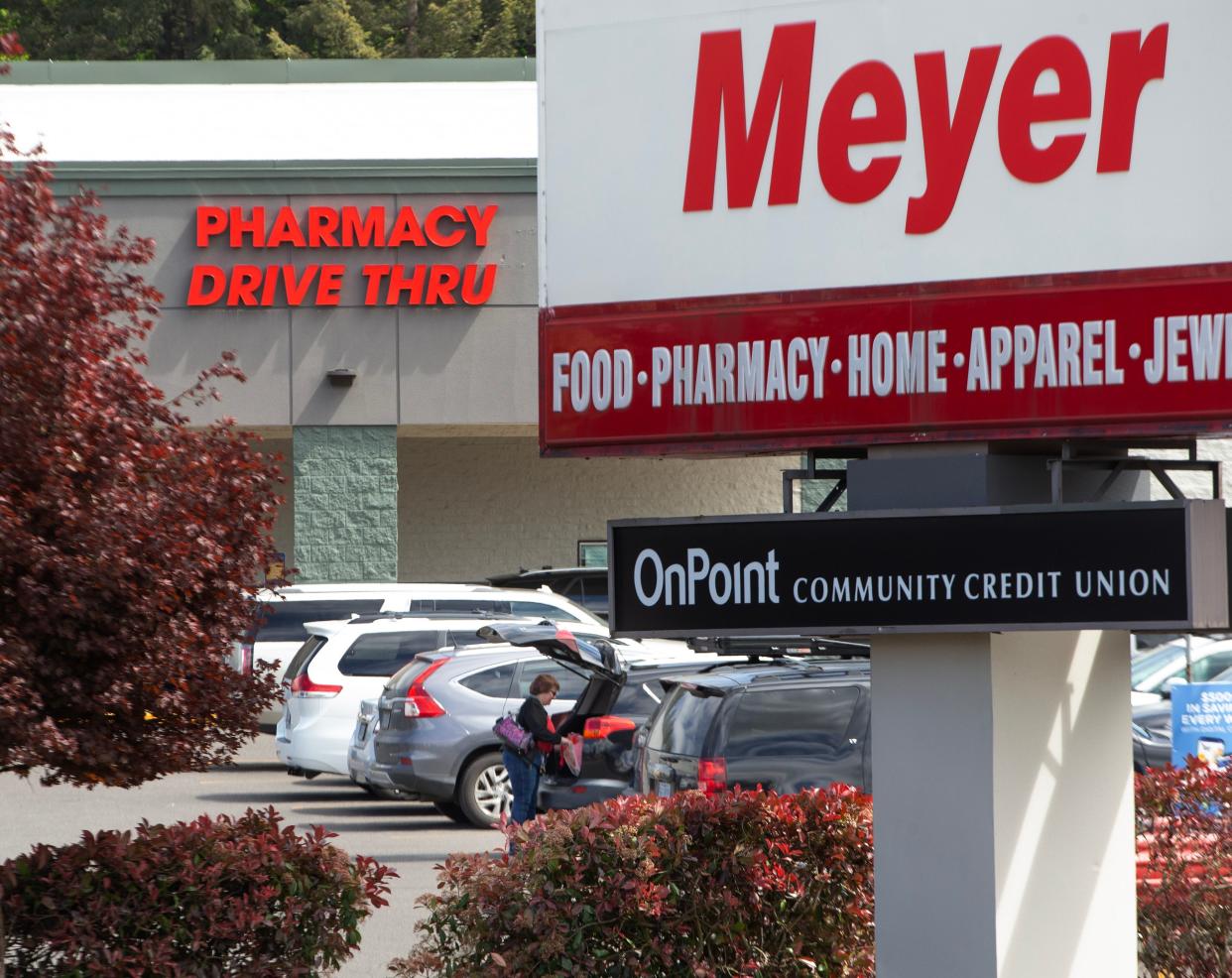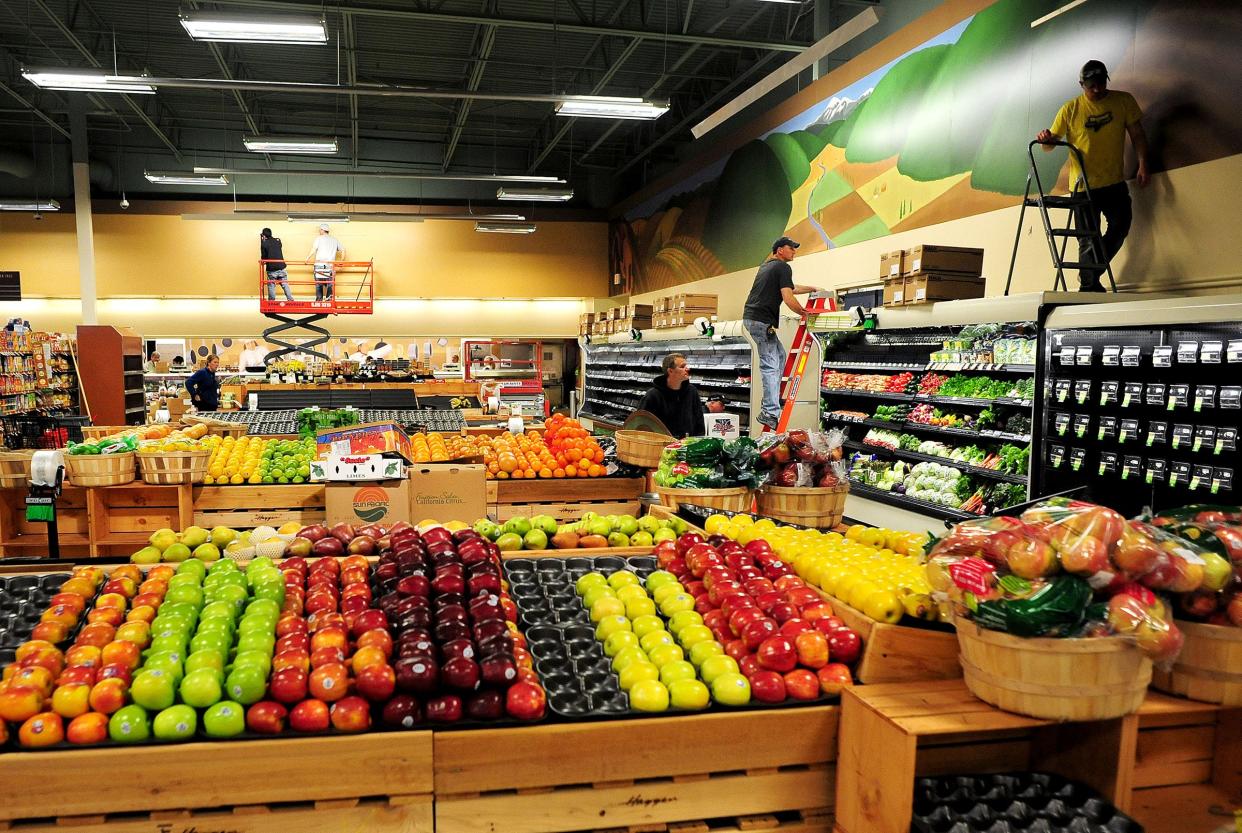Execs mum on sale of stores during Oregon hearing on proposed Kroger-Albertsons merger

Executives testifying during an Oregon Health Authority review board meeting Wednesday about the proposed $25 billion Kroger-Albertsons merger did not say which stores would be sold in Oregon under the deal, or how long they would keep their promise to not close any stores.
In late February, Oregon Attorney General Ellen Rosenblum announced Oregon was joining the Federal Trade Commission and eight other states in a lawsuit to block the proposed merger, due to concerns the consolidation could mean lower wages for employees and higher grocery prices.
The two companies operate 176 stores in Oregon including 51 Fred Meyer and 4 QFC stores under the Kroger company, and 25 Albertsons stores and 96 Safeway stores under the Albertsons brand.
The merger proposal calls for hundreds of stores to be divested to C&S Wholesale Grocers. That also is of concern, according to the lawsuit, which said C&S has limited operating experience with only 23 Piggly-Wiggly and Grand Union retail supermarkets and a single retail pharmacy as of February. The federal court case is ongoing with a hearing scheduled in August.
With the pushback, Kroger, and Albertsons announced Monday it would sell 166 more locations than originally planned if the merger received regulatory approval. Those stores would be sold to C&S Wholesale Grocers, which would buy a total of 579 stores from the companies. Of those, 62 Albertsons and Kroger stores sold would be in Oregon.
The FTC said in its February announcement of the lawsuit that Kroger’s acquisition of Albertsons would lead to higher grocery prices.
The Oregon Department of Justice and FTC investigators said there was compelling evidence that “direct, head-to-head competition” between the two companies forced them to compete against one another on prices and quality of goods and services and working conditions and salaries for workers.
Wednesday’s hearing came from OHA's preliminary review of the merger in which the agency determined it had the potential to negatively impact a significant number of people in Oregon and impact access to care.
OHA preliminary review of Kroger, Albertsons merger
According to OHA’s review, Kroger-owned pharmacies in Oregon provided prescriptions for 22% of all people in the state in 2020-2022. Albertsons-owned supermarkets have 106 retail pharmacies in Oregon stores and provide telehealth services in the state. From 2020-2022, Albertsons-owned pharmacies, some of which are under the Safeway name, provided prescriptions to 25% of all people who had prescriptions filled in Oregon.
The OHA estimated the merger would mean Kroger and Albertsons would go from each holding about 15% of the prescription drug market in Oregon to holding nearly 30% of the retail prescription drug market in the state. The next largest pharmacy provider, referred to as "competitor A' would hold 13%.
Both companies currently own more than 150 retail pharmacy locations in 29 counties. People living in these counties represent nearly 99% of the statewide population, OHA said. The planned sale of stores could significantly impact Oregonians, OHA concluded in its preliminary review conducted before the announcement of additional divestitures.
OHA said it did not know which stores might be sold but assumed candidates could include stores located near each other. There are 35 ZIP Codes in Oregon with both Kroger and Albertsons-owned pharmacy locations where 30% of the Oregon population live.
OHA also pointed to recent history as cause for concern.
“While the entities have committed to keeping stores open, the future for divested locations is less clear. For example, in 2014, Albertsons received regulatory approval to acquire Safeway after agreeing to sell 146 stores to Haggen, a small supermarket chain in the Northwest. Haggen filed for bankruptcy months later and blamed the Albertsons deal for its demise. Albertsons bought back dozens of the stores it had sold, while many other locations closed,” OHA wrote.
Other concerns include changes to the type of insurance a pharmacy accepts. Kroger does not accept TRICARE at its pharmacy as of 2023 which enrolls 69,000 people in the state as of 2022. The transaction could mean Albertsons also could stop accepting the insurance.

OHA community board asks for specifics
During Wednesday's hearing, the community review board asked Kroger, Albertsons and C&S executives for specifics on promises made when it came to pharmacies in Oregon.
Among the nine questions was how long the companies were committing to keeping existing stores and pharmacies in Oregon open after the merger and divestiture.
Colleen Lindholz, president of Kroger Health, repeated the companies were promising they would not close any store, including pharmacies, as a result of the merger.
"We feel so strongly about maintaining and expanding affordable healthcare solutions for our patients that we've made a series of commitments in connection with the Albertsons transaction to ensure zero loss of community health access," Lindholz said.
She said Kroger was merging with Albertsons to expand its presence and planned to invest $1.3 billion to "enhance the customer experience" and another $1 billion to raise wages and benefits, and promised zero layoffs of frontline positions.
Rozanne Schwans, head of pharmacy for C&S, said pharmacy sales make up 10% of sales in its retail stores and the company is committed to making sure those working in acquired pharmacies stay on.
Lindholz and Schwans were not specific when asked in a follow-up question to provide a clearer answer about the duration of C&S and Kroger's commitment to zero closures.
In response to concerns about a repeat of what happened after the Safeway and Albertsons merger, Lindholz said Kroger studied that merger. "C&S looks nothing like Haggen," she said.
Schwans said C&S had similarly studied the merger to ensure mistakes are not repeated. She also said an experienced pharmacist is part of the pharmacy leadership team, to build plans to ensure pharmacy success after the merger and the acquisition of new stores.
"It should be a seamless transition whether we have 200 or we have 800. We're still going to look to work together with both Albertsons and Kroger to make this a success," Schwans said.
Lindholz said Kroger did not have a timeline for when the list of impacted stores would be made public.
"I don't think there's going to be any negative impacts that we need to minimize," Lindholz said in response to questions about how the company would minimize negative impacts on smaller and rural communities that rely on pharmacies. "I don't expect anything negative. We'll always be ready to mitigate anything that may happen. I just don't expect — I think things will be seamless."
Schwanz repeated C&S's goal to "continue the continuity of care."
The hearing concluded with public testimony, with all the commentators raising concerns about the merger.
Kyle Connaughton, pharmacy director at Tillamook Hospital, said he couldn't see how the Oregon Health Authority could make a recommendation without knowing the specific stores that would be divested to C&S.
A Corvallis pharmacist echoed concerns that the information available was too vague.
What's next in OHA's review of Kroger, Albertsons merger
A community review board formed under the Health Care Market Oversight program will make a recommendation on the merger to OHA.
The next community review board meeting is scheduled for May 9 at 10 a.m.
OHA can approve, approve with conditions, or disapprove of transactions.
The public can submit public comments about the proposed merger until the community review board concludes its comprehensive review.
To submit testimony: Email hcmo.info@oha.oregon.gov or leave a voicemail at 503-945-6161, and make sure to mention Kroger in the message.
Public comments may be used in reports and publications. Public comments will be posted on OHA's website.
Dianne Lugo covers the Oregon Legislature and equity issues. Reach her at dlugo@statesmanjournal.com or on Twitter @DianneLugo
This article originally appeared on Salem Statesman Journal: Oregon Health Authority review of proposed Kroger-Albertsons merger
